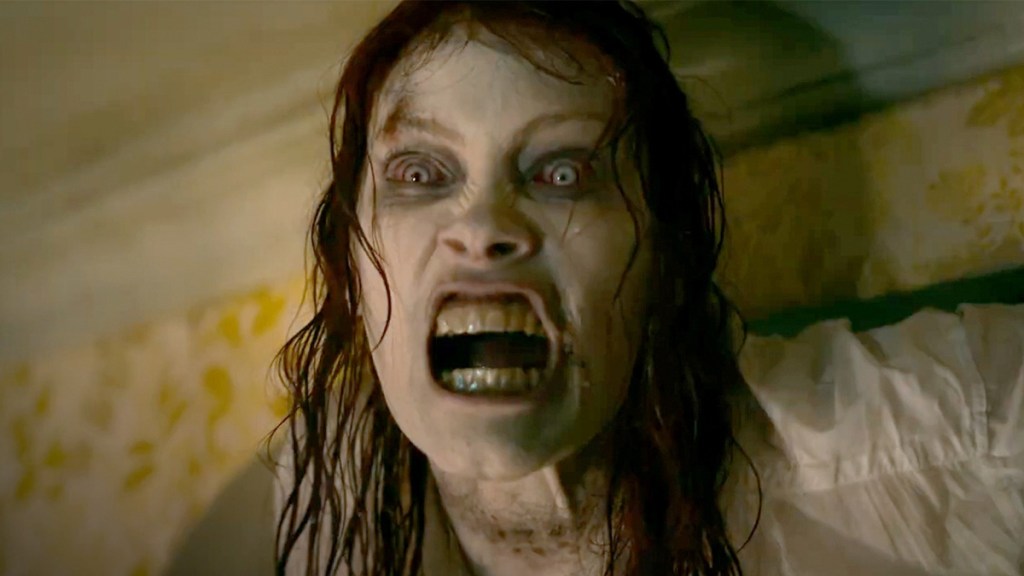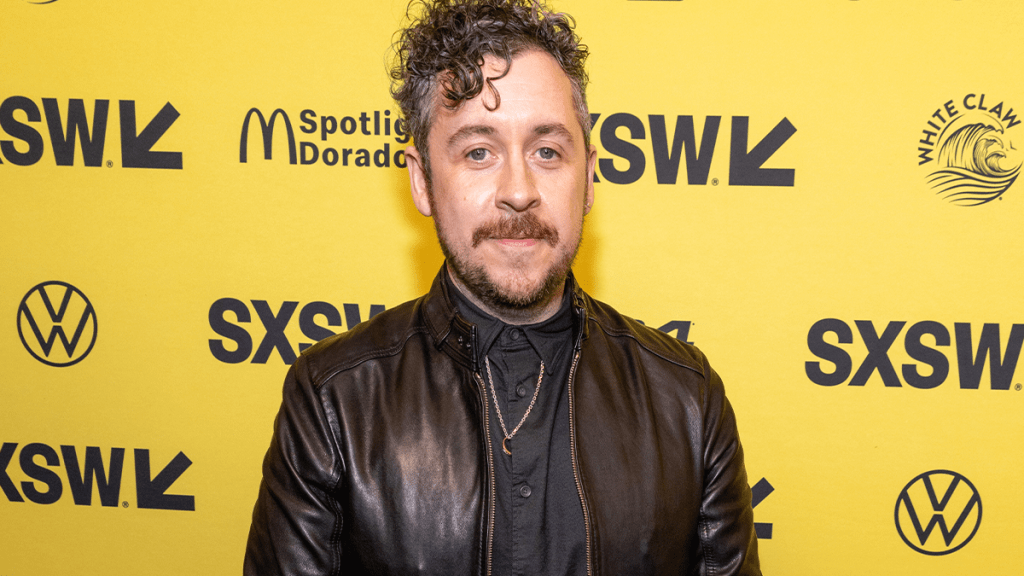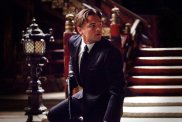ComingSoon Editor-in-Chief Tyler Treese spoke with Evil Dead Rise director Lee Cronin about the intense horror movie, which is out today on 4K Ultra HD and Blu-ray, and is also available digitally and to stream on HBO Max.
“Moving the action out of the woods and into the city, Evil Dead Rise tells a twisted tale of two estranged sisters whose reunion is cut short by the rise of flesh-possessing demons, thrusting them into a primal battle for survival as they face the most nightmarish version of family imaginable,” reads the film’s synopsis.
Tyler Treese: I really love the opening of Evil Dead Rise. We see that very familiar first-person view shot chasing through the forest, but it’s actually a drone — I love that little twist. There are a lot of fun references to the original movies in this, but they don’t feel shoehorned in. How was it, balancing paying tribute while still doing your own thing and not being beholden to the past?
Lee Cronin: Thank you for those compliments. I’m glad that you enjoyed the movie and got a kick out of those aspects of it. I think I always wanted to make a movie that was faithful to what makes an Evil Dead movie special and unique, which was for it to have a kind of manic energy, great horror, super set pieces, [and] a lot of blood, but I wanted to do it with my own spin. So even that thing that you mentioned in terms of the opening of the movie and that point of view, that kind of hit me really early on.
I was like, “Wow, wouldn’t it be cool to open an Evil Dead movie straight in the middle of the forest, just bang, we’re on the move.” But what I also wanted to do was to then subvert that idea and to make people giggle and for the fans to realize that they’re in safe hands with somebody that knows what this is, but at the same time, that I’m going to subvert your expectations and play around a little bit.
The balancing act really, for me … once I found a story, that was the first thing. Story and character was the first thing I found. Then it was about finding the identity, looking at the things that are staples of the franchise, remixing those, and using those in maybe a fresh or original way whilst then trying to bring my own personality, my own approach to horror, my own way that I like to add dread and tension in certain circumstances. So that’s the playground of development and writing. Then trying to settle on what you think is the best blend to go and shoot and bring to the screen.
Evil Dead seems to be this great canvas for a franchise because even Sam Raimi’s movies were wildly different in tone. Some were more humorous, some were more serious. Knowing that you have these certain ground rules that definitely make an Evil Dead movie an Evil Dead movie, but you’re not really beholden to a specific tone, how freeing was that to really tell the story you wanted to do and found most fitting? Rather than thinking, “I’m not sure how fans will react to this,” because they’re already used to very different takes on the series.
I think it’s the very thing that you’ve said there, and part of my excitement was that I knew I had a license to make a movie that has its own tonality, that has its own vision, that has its own voice and has its own point of view as well. For the very reason that what has come before has played around. Evil Dead is quite dark, and obviously it’s gritty, and it’s super low-budget. Evil Dead 2 takes a much more comedic tone. Even jumping ahead and looking at Evil Dead 2013, it’s pretty midnight black — maybe doesn’t have much humor at play. Then with this one, I said I wanted to bring a little sense of my personality, a little bit of wit, a little bit of levity, but also just a huge kind of driving energy behind all of that.
So it’s kind of rare that you can basically pick and choose and have fun with how you draw lines to the past and what’s existed in the franchise whilst, at the same time, just driving forward and doing something that feels like its own movie. I think there’s a lot of audience that have come to experience this movie as their entry point to the Evil Dead world and maybe didn’t even know that it was part of something that existed. They may have just seen a poster or a trailer and gone, “Whoa, this movie looks really scary. I want to go check it out.” Then they get to go back and discover all that has underpinned the journey to Evil Dead Rise.
Bruce Campbell has been out here championing the movie, giving it so much support. What did it mean to not only get that voice cameo from him for the movie, but for him to be such a supporter of it?
Yeah, it’s great. We’re all in the same boat because we want to make a successful film. The guys performing the more producerial roles on this movie … we were all pulling in the same direction and, for me, it was really at the start of the journey, because when you cross the line and make a film, you need to know that people are backing what it is that you want to do, what your ideas are, how you want to bring something to life.
Rob [Tapert], Sam, and Bruce all showed great support for my vision early on. So I kind of always expected that if I delivered on the promise and delivered on what it was that I intended to do, that they’d continue to support that film. That collaborative effort has played a part in the success of where the movie is right now.
Speaking of backing, Warner Bros. Shifting this from streaming to theatrical had to be such a great co-sign. How was it knowing that they had your full belief and they were going to go out and market this, put it in theaters, and go from streaming to theatrical?
Yeah, look, it was a great moment in a long and complex journey that this movie was to bring to life. So I think everybody always believed it could have that theatrical potential. From my point of view, I’m kind of a theatrical filmmaker. That’s not to say you can’t have a great time watching this movie at home, because you also can. You can gather friends, sit down, and have that experience — just make sure you turn down the lights and turn it up loud. But from my point of view, it was great to have that support, and I think one of the processes when you make a movie like this, and I embrace it as actually testing your creation with audiences.
As we went on that journey and refined what the movie was, by the end of that process, we knew we had something that, to coin the old phrase, really played in a room and that people were going to get behind and support. It had some really creepy elements to it, and it has all of those ingredients to go and present to the world and hope that people want to come along and join the ride, which, thankfully, they did.
One aspect of the movie I really enjoyed was the personal stakes in that we got to explore so many different family dynamics. We have the sister-to-sister relationship, we have the relationship to the mother, we see all these interesting dynamics. How was fleshing that out and really giving rise that thematic resonance?
That was the starting point for me. As a filmmaker, in order for me to start writing anything, I need to find some sort of metaphor. I was never trying to play this as a really heavy movie — it still had to be an Evil Dead movie that essentially is just guts and glory entertainment once it all kicks into gear. But I wanted it to be about people you could identify with. So that was really the starting point for me. I would always back myself to create the terror, create the horror, create the thrills and the chills.
But what I needed to go and do was find a set of characters. I’m quite often drawn to stories about families in peril, about domestic circumstance. I just found that window where I had a character in Beth that’s at a crossroads. She’s pregnant and maybe she is unsure about what to do. So she goes looking for support at home and then ends up also facing the worst version of family. But that doesn’t mean she doesn’t necessarily ever want to have a family, because also the strength in coming together and trying to survive is a powerful thing as well.

You’ve detailed some really fun sequel ideas before. An idea is one thing, but are you really hoping to turn one of those into reality? What can we expect?
I have a massive, massive affinity to Evil Dead that goes before even making this movie from childhood, as I’ve talked about before, and obviously feel a great sense of passion about what this movie has done. So yeah, there’s always … I think there’s always opportunities and the potential there to bring things to life. I think there’s a lot of cool aspects to this movie. I think one of the things it maybe has that is a little different to previous movies is a real out-and-out big bad that plays out in that movie in the context of Ellie when she’s possessed. So there’s definitely fun things to explore.
I’ve got great respect for Sam, Rob, and Bruce, as they do for me. It’s a case of seeing if it’s right for everybody. I think that’s ultimately what it comes down to. They’re producers, they’re creatives. I’m a writer-director, I’m a creative, so we’re never going to stop talking about the potential. Some of the things we spoke about was even on set when we were making the movie in the first place. So it’s always like a “watch this space” type of thing. I think if the story’s right and the reason to make the movie is right, then I think the potential for more is going to be there.










